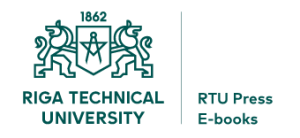Latvijas energoefektivitātes politika apstrādes rūpniecībai pārejā uz Eiropas zaļo kursu
Summary of the Doctoral Thesis
By 2030, the European Union (EU) must ensure a 32.5 % reduction in energy consumption compared to the 2007 baseline scenario projection. In Latvia in the period from 2021 to 2030 the cumulative energy efficiency savings of at least 73.7 PJ or 20.5 TWh are expected to be achieved, with the largest share of energy savings coming from the manufacturing sector. On December 11, 2019 the European Commission (EC) set out even more ambitious EU climate targets by publishing the European Green Deal, aiming at EU climate neutrality by 2050, which is not possible without the immediate and significant involvement of industry, while recognizing potential competitiveness risks with global players from countries and regions, where the level of ambition of climate targets lags behind the EU. Significantly, the European Green Deal does not offer to address the risks of industrial competitiveness through subsidies or tax rebates, but emphasizes the importance of energy efficiency policies in energy-intensive industries as one, if not the only, sustainable solution for maintaining global competitiveness. The aim of the study is to analyse Latvia’s energy efficiency and energy policy in relation to manufacturing industries, assessing the impact of existing policies on energy efficiency and reduction of carbon dioxide (CO2) emissions in the transition to climate neutrality defined in the European Green Deal, and provide recommendations for future policy instruments. The analysis includes a comparison of Latvia’s industrial energy intensity with other EU countries, as well as an assessment of the technical potential of energy efficiency in key Latvian manufacturing industries using industrial energy audit data and statistical data processing methods and benchmarking them with results of similar policy studies, assessing the potential for undiscovered energy efficiency and CO2 emission reduction potential in leading industries in Latvia. The dissertation is designed as a set of publications, which combines parts of scientific publications written during doctoral studies. The introduction reflects the aims and objectives of the study, as well as a brief description of its scientific and practical significance. The first chapter examines the existing energy efficiency policy, its goals and literature review of similar policies. The second chapter provides an analysis of Latvia’s industrial sectors, their energy intensity and CO2 emission intensity. The third chapter examines the impact of support policy for energy-intensive industrial enterprises on energy efficiency measures using system dynamics modelling, as well as quantifies these support measures. In the fourth chapter, a comparative analysis of industrial energy audit data in leading industries and an assessment of the undiscovered potential of energy efficiency is performed. In the fifth chapter, the analysis of Latvia’s energy efficiency targets for industry is performed, taking into account the historical and target data of industrial energy intensity and interpreting the necessary trajectory in the context of the European Green Deal. Finally, conclusions and recommendations for future policy instruments are provided.
Additional information
| DOI | |
|---|---|
| Publication type | |
| Hyperlink | |
| Defence date | 01.07.2020. |
| ISBN (print) | 978-9934-22-461-4 |
| ISBN (pdf) | 978-9934-22-462-1 |
| Format | |
| Pages | 40 |
| Published online | |
| Publisher | RTU Press |
| Country of Publication | Latvia |
| Publication language |
You must be logged in to post a review.




Reviews
There are no reviews yet.